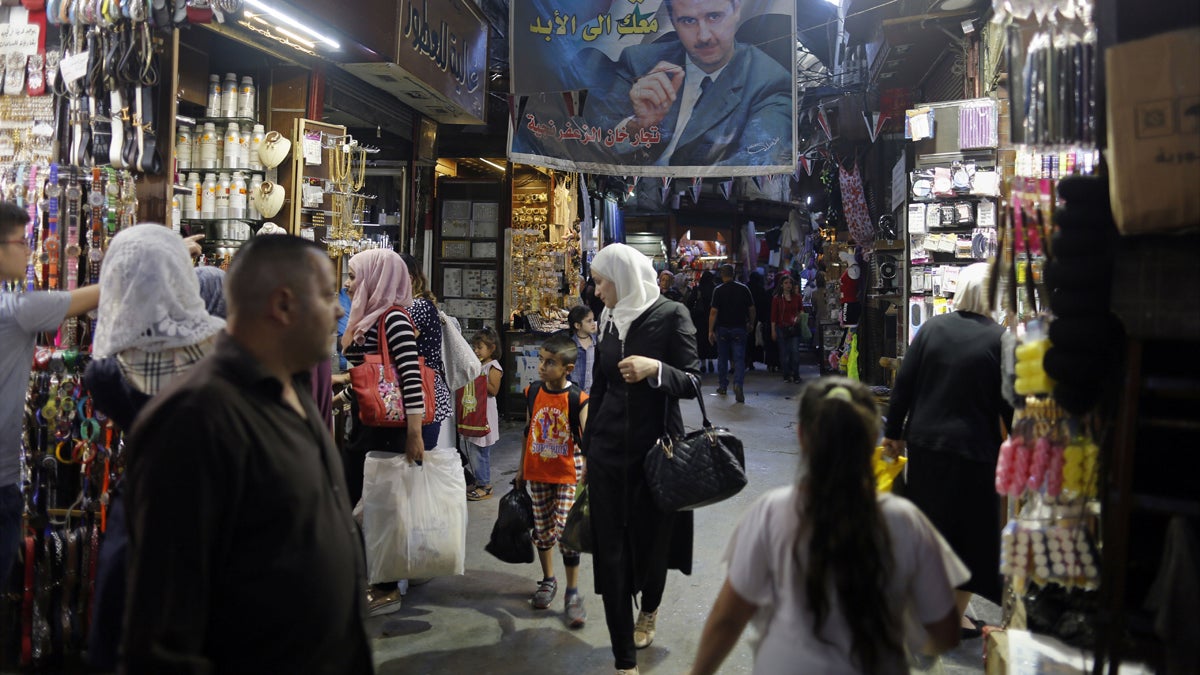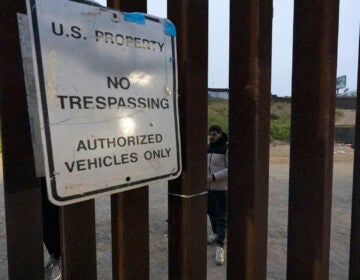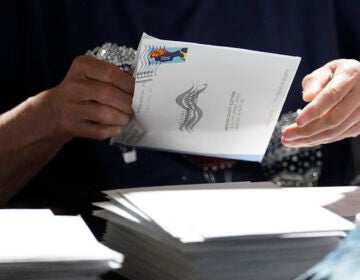Alia Malek challenges us to reimagine Syrian-American
News about Syria stresses geopolitics, so it takes some effort to find an article remidning us that Syria is an actual country with people living there, and dying there.

Syrians shop at the Hamadiyah market, or souk in Arabic, that was named after the 34th Sultan of the Ottoman Empire Abdul Hamid II, in the Old City of Damascus in May. (AP Photo/Hassan Ammar, file)
To many Americans, the word “Syria” brings to mind horrific images: faces blistered by chemical warfare, destroyed neighborhoods, that refugee boy on the beach beside his empty sneaker. The country’s name becomes a political buzzword, a fractured map argued over by politicians.
The news of the day stresses geopolitics or the effect on the United States, so it takes some effort to find an article mentioning that Syria is an actual country with people living there, and dying there. It takes a little more effort to find stories that quote actual Syrians — like this one, in which two doctors plead for the world not to forget their country.
How can we remember if we have no idea what that country is — or was — beyond the desert and camel clichés of “Lawrence of Arabia”? What if we’re wrong about the deserts, too?
It helps to read the work of a whip-smart lawyer I know, a Syrian-American journalist whose ideas about Syria are as compelling as her stories about her parents’ home country. Her new book, “The Home That Was Our Country: A Memoir of Syria,” feels like it was written in response to that question.
I knew Alia Malek was a star when we met a dozen years ago, as classmates at the Columbia University Graduate School of Journalism. A civil rights lawyer who’d quit George W. Bush’s Justice Department, she’d already lived and worked in Italy and Lebanon and was just starting her first book, “A Country Called Amreeka: Arab Roots, American Stories.”
By the time “Amreeka” was published, I had moved to Philadelphia, and our paths had diverged: I cheered Malek long-distance as she was hired as a reporter at Al-Jazeera America and published a dizzying succession of new books, including a graphic novel. I only knew third-hand that she’d gone to her family’s homeland during the 2011 Arab Spring.
The resulting book is much more than a family memoir; it’s a needed corrective to the flattening of our perceptions of Syria. When my copy arrived in April, I’d meant to read it slowly, but I could barely put it down.
Malek begins by narrating the country’s birth, first through the story of her larger-than-life great-grandfather, Abdeljawaad, and his wife, Marta, who once tore down the gates of the family’s compound and built ovens to feed the poor. Malek makes abstract-seeming personas tangible, even the founder of Ba’ath and rival Islamic and secular factions. Syria as a multicultural, not-quite-Arab entity with equal roots in the Levant, now feels like a fairy tale — until Malek makes it real and heartrending.
In those opening chapters, history I’d thought I knew was reframed and colored by these characters — especially their daughter Salma, who moved to the country’s capital and into that apartment block where Malek lived in 2012. The book’s pace quickens with Malek’s first visit to Syria in 1992, and reels you into its novelistic narrative.
Last month, I caught up with Malek just as “Home” went into its third printing. I asked her if this book had been in her mind when she moved to Syria in 2011.
“I had long fantasized of writing a book on Syria and focusing on my grandmother,” she said. “There was never a market, though. Until the country fell apart … ironically but not surprisingly.”
She was encouraged to move to Syria by her close friend Anthony Shadid, a New York Times reporter who’d also written about his family’s Lebanese home in “House of Stone.” By the time Shadid’s book came out, he had died suddenly in 2012 while attempting to leave Syria, and Malek was in Damascus. Before his death, Shadid had suggested she make Salma’s home her way into the story.
When Malek moved to Damascus in 2011, she also had a practical project: To renovate the part of Salma’s apartment block that had always been meant for her family. She could interview long-lost relatives and ask them about Salma, the grandmother she’d lost to a stroke 20 years earlier.
While they were mostly glad to talk to her, her relatives and neighbors warned her that that the government of Bashar al-Assad was watching her. They worried as she reported and wrote (without a byline) about what that government was doing, knowing that Malek’s legal training and skill with language could be seen by Assad as a threat.
Those same qualities, Malek agreed, were crucial in reporting and writing Salma’s and Syria’s story. Speaking the subject’s language, even in their dialect, shed said is “so important. I could move around in the building, talk to different people” without a translator in tow. “You can just exist.”
But the legal training was essential, too, she added, in understanding what she was hearing.”Law school gives you a kind of rigor. You become skeptical and unwilling to accept pat answers.” That proved as useful with the contractors working on her house as it did in understanding how Syria was beginning to crack open.
The latter half of “Home” chronicles what Malek saw as Assad began to crack down on resistance in Syria, including the civil-society groups that had sprouted during the Arab Spring. She writes about activists who brave Assad’s jails again and again. This excerpt published in Teen Vogue describes one group whose only offense is carrying carnations and wearing a sash that reads “Stop the killing!”
“The regime sees civil society as the enemy,” Malek told me. “It lives on moral murkiness. And those groups challenge the story they’re telling the world, that only violent islamic terrorists oppose their system.”
She also travels to Salma’s hometown, Hama — first as a happy if parochial place, then in 1982 as a site of massacre, when Hafez al-Assad’s forces kill thousands after nonviolent protests. Malek introduces that phase of Syrian history with characteristic poetry: “A year and a half after Salma’s stroke shattered her, Hafez al-Assad broke her native Hama.” Malek’s family story deepens that of international events: When Assad splinters Hama, we can almost hear windows breaking.
Her more contemporary visit occurs when she travels there to attend a cousin’s wedding, 20 years later and a year after after Assad sent troops to quell the 2011 protests.
When Malek ventures to the now-destroyed Aleppo, she has already described for us the lovely, multicultural city she loved when she visited in 2002. I told her that her descriptions make me miss the Syria I will now never know, from “Aleppo’s great restaurants” (a phrase I never thought I’d read) to a once more multi-religious Damascus. She renders just as vividly the losses that preceded her story. The loss of Damascus’ once-thriving Jewish Quarter brought me to tears.
And I thanked her for debunking “Lawrence of Arabia,” a movie I first saw, like her, in Baltimore’s Senator Theater in 1989. Her rigorous analysis tackles against the story of Syria told most famously in that film, of plucky Arabs fighting imperial overlords.
“For so long, I didnt realize that version wasn’t true!” Malek told me. That story hadn’t comported with her own sense of her family history. The more she read, she saw Syria less in Arab terms and more as part of the the eastern-Mediterranean region known as the Levant.
“The standard history, permanently being taught, is this narrative that positions Syria in the Arab world,” Malek said, her voice rising in frustration. “I’m ok with ambiguity, but there’s a more honest way of describing how it happened.” Syrians have the right to have a choice! We can ask, ‘Are our interests the same as Saudi Arabia’s?'”
Malek interviewed several historians, many of whose works are published in English and French but not Arabic, and whose work challenges the “pan-Arab” narrative. “A lot of people think that history is true,” she told me. “We had all fallen in line with that narrative. But that historical period has been reread by historians, affirming that Syria was much more a part of Anatolia, the Levant.” Westerners, Malek added, too often take up the pan-Arab narrative and reduce it to religion, forgetting the diverse countries hidden behind that veil. Such stereotyping becomes a fatal error, she said, now that hundreds of thousands of Syrian refugees are seen by so many as alien.
After she left Syria in 2013, Malek began writing about the country’s refugees, too, reporting from Armenia and from refugee centers in Germany. The book’s epilogue takes place in Frankfurt, where Malek talks with some members of a family she knew at the Tahaan. They’ve made the perilous journey and ended up as refugees in a country where, as one tells her, “No matter what I do, I will always be a stranger ….” Malek’s narrative can help us see Syrians more wholly, and lessen that estrangement just a little.
I asked Malek if her publisher had thought of sending copies to every member of Congress. She laughed, but I was semi-serious. I also felt honored to know someone who had written such an important work, one that turns history sideways and challenges all of us to enter.
WHYY is your source for fact-based, in-depth journalism and information. As a nonprofit organization, we rely on financial support from readers like you. Please give today.




